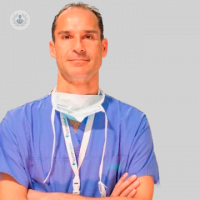What is pancreatic cancer?
Written by:The pancreas is a non-vital organ that is located in the deepest and back of the abdomen, and has three distinct anatomical parts: the head, body and tail. Its functions are:
- Endocrine: producer of various hormones, the most important insulin, which regulates the amount of sugar in the bloodstream
- Exocrine: producer of enzymes or ferments that are dumped into the digestive aid digestion especially of protein and fat.
Pancreatic cancer is one of the most aggressive, as it has no clear symptoms until the disease progresses and often affects other organs.

What are the symptoms of pancreatic cancer?
Despite being a disease that no acute symptoms in the beginning, pancreatic cancer often cause discomfort of varying intensity and a little steady course (not relieved by eating, lasts for more than a week ...) in the stomach and, interestingly, in the back.
When loss of appetite or unexplained weight are associated, these symptoms should be taken as warning signs to go as soon as possible to a specialist pancreas, who is usually a specialist in General Surgery and Digestive with special attention to this type pathology. Finally, if we were to define a characteristic symptom of the pancreas as it is jaundice (ie, that we pigmentamos skin and eye conjunctive and urine become dark color and feces are clarified); Jaundice occurs when the tumor has its location, the head of the pancreas, and compresses to grow the main bile duct, "clogging" the flow of bile to accumulate into the blood.
Increasingly they perform more imaging tests in patients with symptoms of abdominal pathology, which allows you to see lesions that previously only peeked when the disease was more advanced, and the patient had lost a lot of weight and appetite and even, sometimes, incidental pancreatic cancer diagnoses or its precursor lesions.
Adenocarcinoma or pancreatic cancer is very aggressive. Therefore it is important to go as soon as possible to a specialist surgeon in diseases of the pancreas to determine if they can be removed or not, decision that is always arranging at least one CT and MRI high resolution and a study of tumor markers blood (CEA and CA 19.9).
Regularly this cancer affects one part of the pancreas. In these cases only the affected part is removed, not the entire organ. Fortunately the rest of the remaining pancreas of the patient can continue to fulfill, in most cases, their double metabolic function. Only a small percentage of patients (especially when the head of the pancreas is removed) will usually require diabetes medication insulin secreted deficit after surgery for pancreatic cancer.
There are other times when it is necessary to completely remove the pancreas. In these cases, the patient faces a life that requires much attention and particular care to address the lack of the pancreas.
Who cares affects pancreatic cancer?
Pancreatic cancer affects mostly men, although women are not excluded of suffering. They are usually diagnosed after 45 years. The snuff, alcohol, overweight and family history are an important risk factor in this disease, with special mention for people with diabetes since patients with type II diabetes (diabetes developed in adulthood and due to being overweight or obese) they are more likely to suffer from pancreatic cancer than the rest of the population. However, pancreatic cancer anyone can get it even if you have known risk factors.


